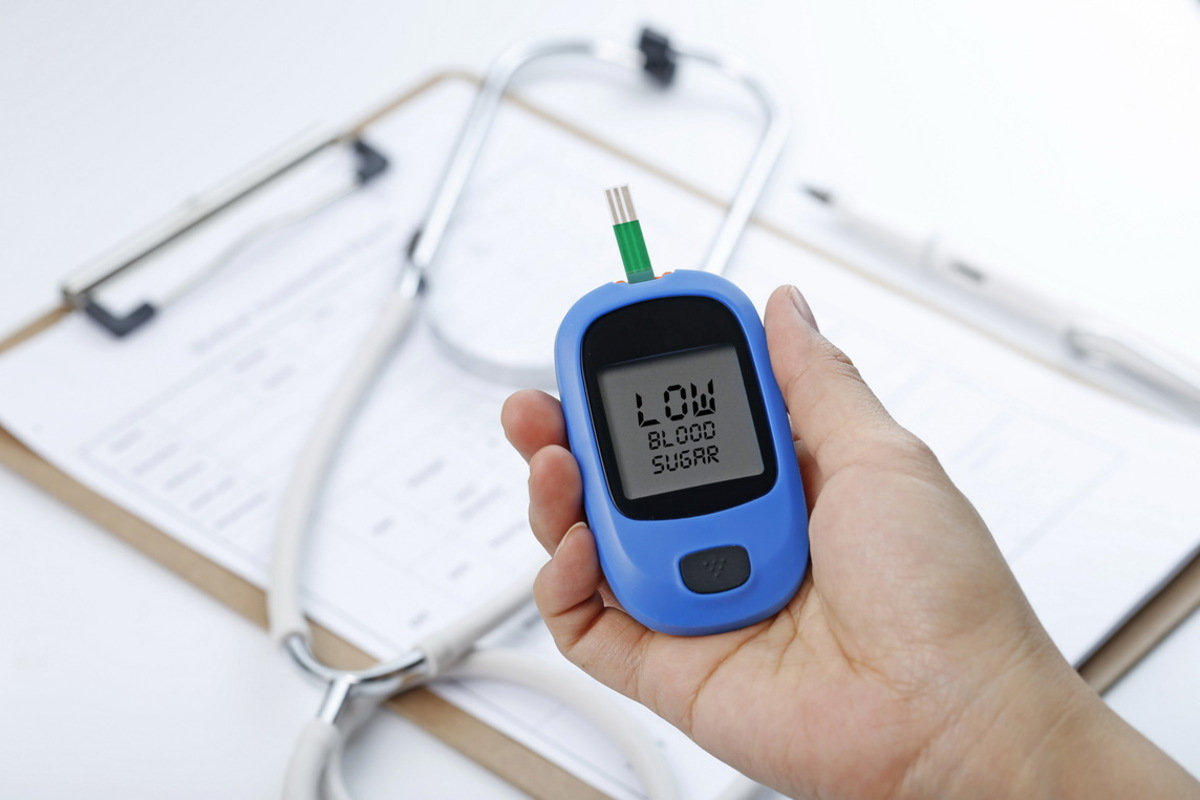Diabetic hypoglycemia is a condition in which diabetes patients have low blood sugar levels. The definition of hypoglycemia is a blood sugar level of less than 70 mg/dL (or 3.9 mmol/L).

Causes of diabetic hypoglycemia
While it might seem counterintuitive that patients with diabetes can experience hypoglycemia, as diabetes is a condition primarily characterized by hyperglycemia (high blood sugar levels), there are several reason why diabetic patients can develop hypoglycemia. These include:
- Taking too much diabetes medication, such as insulin, metformin, or others.
- Missing a meal or not eating enough.
- Drinking alcohol.
- Exercising harder or for longer than you usually would.
Warning signs of diabetic hypoglycemia
These are the early warning signs you (or a loved one) need to watch out for in order to make sure you catch hypoglycemia early on:
- Feeling shaky
- Feeling dizzy
- Sweating profusely
- Feeling hungry
- Being irritable or moody
- Having anxiety or being nervous
- Having a headache
- At night time, having damp or wet sheets due to all the sweating
- Having nightmares
- Being irritable, tired or confused when waking up
Symptoms of severe hypoglycemia include:
- Feeling clumsy
- Having jerky movements
- Having muscle weakness
- Having difficulty speaking or slurred speech
- Having blurry or impaired vision
- Feeling drowsy
- Being confused
- Having convulsions or seizures
- Falling unconscious
- In severe circumstance, coma or death
Therefore, you need to take the early warning symptoms very seriously. Being hypoglycemic can also put you at a higher risk of serious accidents. You need to recognize the factors that contribute to the development of hypoglycemia (such as missing medication or having irregular mealtimes) and try to avoid them as much as possible. You should also make sure to inform the people around you, such as family and co-workers, about the symptoms of hypoglycemia so they can recognize them and get you the help that you need.
Treatments of diabetic hypoglycemia
You need to act quickly if you have symptoms of hypoglycemia. If you are slightly hypoglycemic, you need to immediately work to raise your blood glucose levels. This includes consuming 15 to 20 grams of fast-acting carbohydrates that won’t take long to metabolize, like:
- Glucose tablets or gel
- Fruit juice
- Soft drinks (not diet)
- Sugary candy (such as licorice)
Do not consume foods that have high fat or protein content, as that actually reduces the rate at which your body absorbs the sugar. Once you have consumed the food or drink, check your blood sugar levels again. If the blood sugar levels are still under 70 mg/dL, have another 15 to 20 grams of carbohydrate and check your blood sugar levels again in another 15 minutes. Essentially, you need to repeat this until your blood sugar levels have reached 70 mg/dL or more. Once your blood sugar levels have normalized, it is important to have a proper snack or meal.
In severe circumstances where you are no longer able to consume foods by mouth (in case you are unconscious), somebody will need to give you an injection of glucagon or intravenous glucose. It is important that nobody feed you anything if you are unconscious, as that can lead to choking. If you are prone to developing hypoglycemia it might be best for you to have an at-home glucagon kit and train someone around you on how to use it. If you don’t have a glucagon kit on hand, you need to be taken to the hospital right away. Always make sure to also keep fasting-carbohydrates as snacks wherever you go.
If you find yourself experiencing hypoglycemia multiple times a week, you may need to go see your doctor and come up with another treatment plan. You doctor may need to change your dosage or adjust other parts of your treatment so that you no longer experience hypoglycemia this often.
Prevention of diabetic hypoglycemia
The potential ways to prevent hypoglycemia include:
- Don’t skip a meal or snacks, especially if you are taking insulin or other medications as you need to be consistent with what you eat and when you eat.
- Monitor your blood glucose levels consistently so that you know if your blood sugar levels dip.
- Take your medication properly, and on time.
- Adjust your dosage of medication depending on how much physical activity you are doing, in consultation with your doctor.
- If you drink alcohol, have a snack alongside it.
- Record when you experience hypoglycemia in order to determine if there is a pattern.
- Have some sort of identification on your body in case you lose consciousness and need to be taken to the hospital. This should indicate that you are diabetic.
- Cryer, Philip E., Stephen N. Davis, and Harry Shamoon. "Hypoglycemia in diabetes." Diabetes care 26.6 (2003): 1902-1912.
- Diabetes Control and Complications Trial Research Group. "Hypoglycemia in the diabetes control and complications trial." Diabetes 46.2 (1997): 271-286.
- Cryer, Philip E. "The barrier of hypoglycemia in diabetes." Diabetes 57.12 (2008): 3169-3176.
- Photo courtesy of SteadyHealth


Your thoughts on this